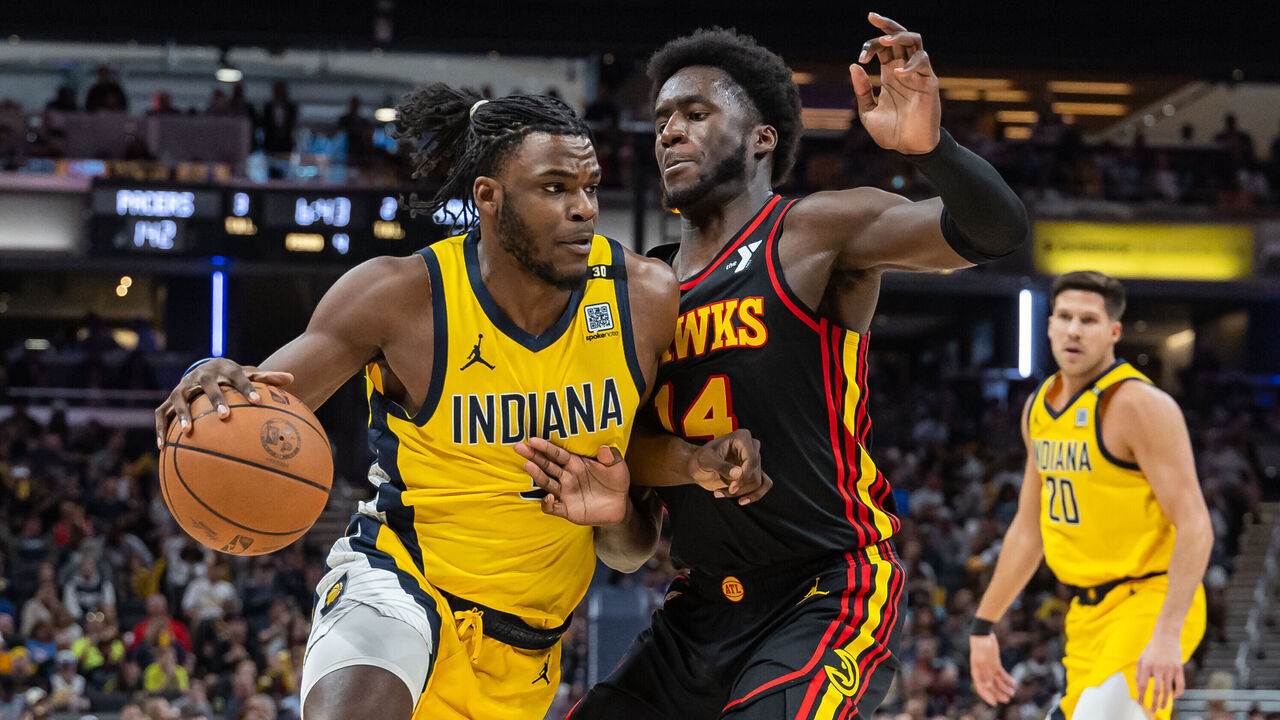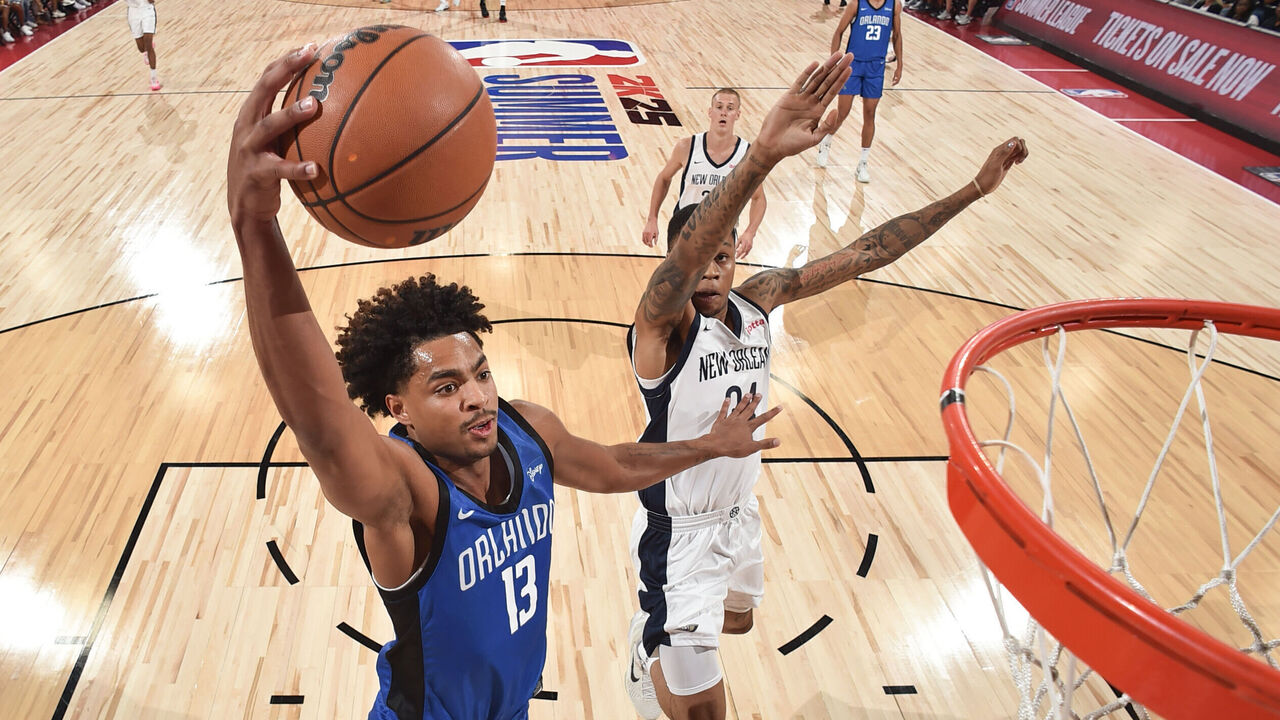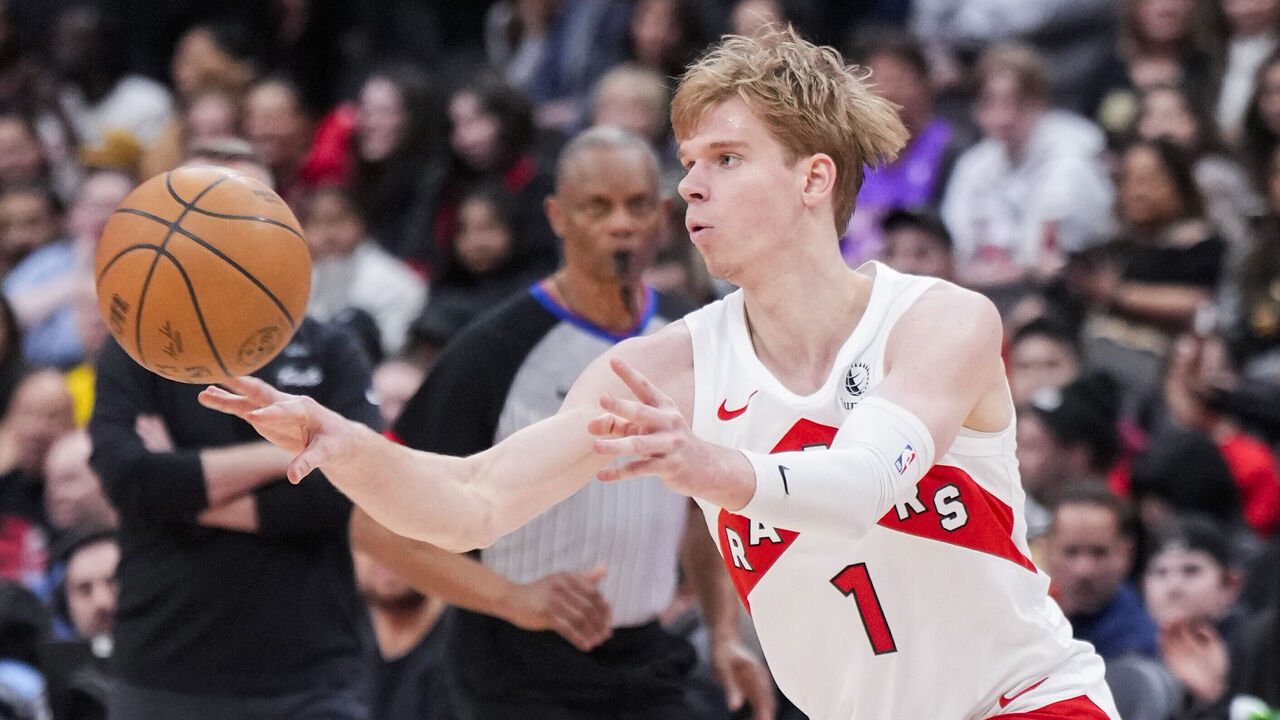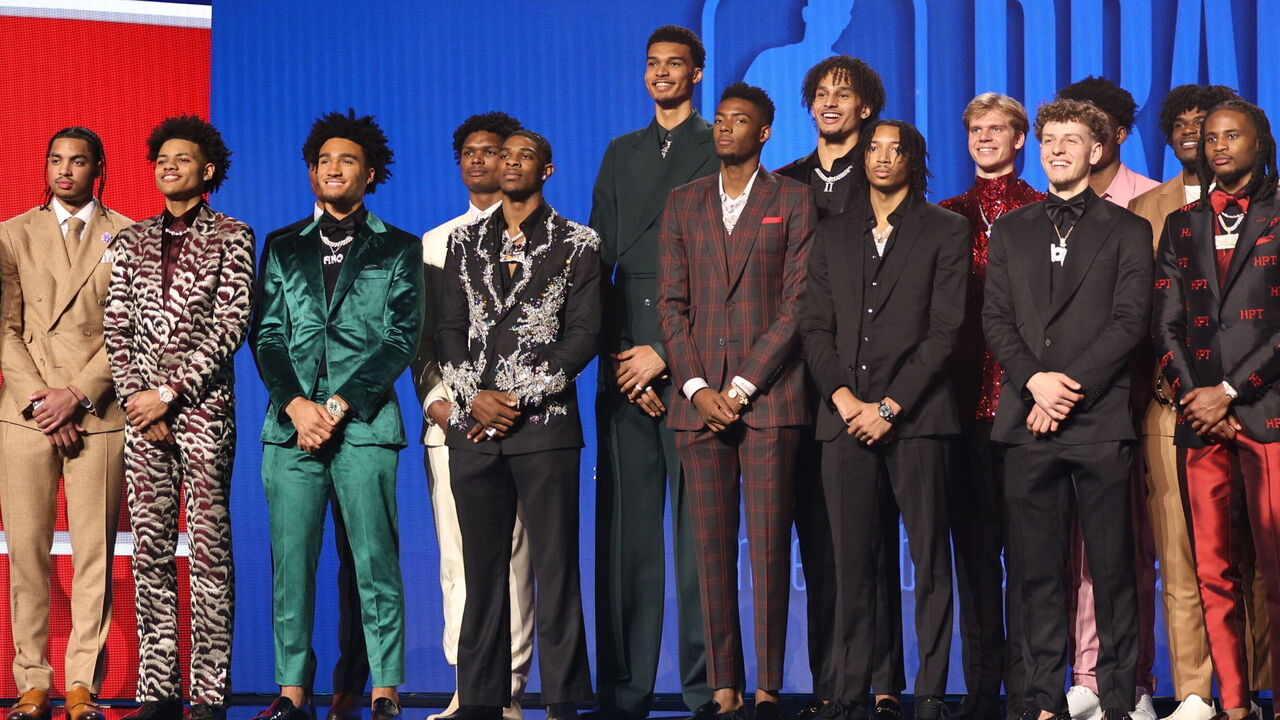How this Summer League trio is preparing for Year 2 breakthroughs
LAS VEGAS - It's pretty easy to spot the second-year players on a Summer League court, especially the former first-round draftees. In this environment, they're seasoned vets for whom the game feels slower and the reads come easier. They tend to look out of place (in a good way), and that's often true even of the sophomores who barely saw any NBA game action during their rookie seasons.
"It's totally different (from last year)," Pacers forward Jarace Walker said after putting up 25 points, six rebounds, four assists, and two steals in the first game of his second Las Vegas Summer League. "The game's definitely way slower."
Walker was drafted eighth overall by the Pacers in 2023 but played just 340 NBA minutes (many of them in garbage time) last season, due initially to his own lack of readiness and later to the team's frontcourt logjam following its midseason acquisition of Pascal Siakam. Walker spent ample time in the G League and put up strong numbers there, but to hear him tell it, his time in the NBA ecosystem was more influential, even as he spent most of it watching from the sidelines.
"You learn so much just from being around those guys," he said. "I mean, watching 82 games - and then we had a good playoff run - just watching and practicing day in day out, you pick up a lot."
Part of that learning process involved getting a better handle on concepts, schemes, and situation-specific coverages, but for Walker, the most important lessons were about "how to be a professional."
"Always being on time, making the right decisions on and off the court, getting your sleep, hydrating," he said. "Little things like that really impact you, especially doing all this traveling. It's a lot of moving around, a lot of hoops, so you've definitely got to learn how to take care of your body."

Jett Howard was picked three spots after Walker and played even less as a rookie for the ascendant Magic, seeing just 67 minutes at the NBA level. That didn't prevent the 6-foot-8 swingman from looking like one of the best players on the floor in his first three games in Vegas this year, averaging 19 points and 3.3 assists, shooting 53% from 2-point range and 48% from deep, and making some crisp rotations within the team's defensive scheme.
"I just think my awareness on defense, knowing where to be, not getting sped up," Howard said of the difference between this Summer League and last. "You know where your shots are coming from, so you're not really hunting as much. Everything's more in the flow of the game."
Perhaps most importantly, a year in the league gave Howard a better sense of the specific aspects of his game that needed work, and he entered his sophomore summer with much clearer developmental objectives.
"You know where you're at with your game (after a year) in the NBA, and then it's just about filling in those holes. Not working on a vast majority of things but more just trying to master little things - my pull-up going left, my pull-up going right, my closeouts, stuff like that. … The league kind of clarifies things," Howard said.
"Right now, I'm looking to fill in my one-on-one defense and my team defense and just learn all the principles, all the terminology, even back to the fundamentals a little bit on that side of the ball. On the offensive end, I want to learn how to get to the hole at a faster rate when they run me off the line and to look up and find open guys and make the right read."

Gradey Dick had a slightly different rookie-season arc. Picked two spots after Howard, he wound up playing a lot in the second half for a scattershot Raptors team transitioning toward a rebuild. His pro career began similarly; he also struggled to adjust to the NBA and quickly found himself on a G League assignment. But Toronto's injuries and shifting priorities meant opportunity knocked for him eventually.
Dick took his opportunity and ran with it. Before he was sent down in late November, he averaged 3.9 points per game, shooting 32% from 2-point range and 25% from deep. After being recalled in mid-January, he averaged 11.1 points while shooting 52% inside the arc and 40% from beyond it.
"Playing an 82-game season, you see a lot," Dick said. "I had one of the best vets of all time, Garrett Temple, and his advice was ... you're gonna go through ups and downs, you can't get too up and you can't get too down. And I think that's the biggest thing - just staying even and playing your own game. Because there were some rough patches in those first couple months that weren't fun to be in, obviously. But going through the middle of the season and playing good toward the end made all of that worthwhile."
Dick now has a chance to be a starter in his second season, and he isn't taking anything for granted.
"I'm coming in with the same mindset of just wanting to work," he said. "What's different is, having that year under your belt, you know what you need to improve and what you need to work on."
His primary offseason focus?
"For me, it's about not just being classified as a shooter," he said. "I was fortunate to be able to show more areas of my game last year. So it's just (to continue) showing the versatility of my (offensive) game, combined with defense and playing both sides of the ball. ... You can always improve defense. That's not something that's just gonna get better out of nowhere; it really takes daily work."
Dick showcased that versatility in his first Summer League game, a 25-point Raptors win in which he was arguably the best player on the floor despite going 0-for-4 from deep. He slashed and drove his way to 18 points, followed his uncanny rebounding nose to 10 boards (including four on the offensive glass), dished out six assists, and played heady team defense that included swiping two steals and drawing a charge.

Dick remains the only sophomore of this trio with a clear path to consistent playing time in 2024-25. Walker enters the season behind Siakam and Obi Toppin on the Pacers' power-forward depth chart. Howard is on a team loaded with wing talent, with Paolo Banchero, Franz Wagner, and free-agent signee Kentavious Caldwell-Pope ahead of him at the positions he can theoretically fill. He could also wind up getting leapfrogged by rookie Tristan da Silva, a Summer League standout who is two years older than Howard.
All three guys are still just 20 and in need of refinement, but all of them possess skills or physical tools that could address crucial needs for their teams. That makes this a critical developmental summer for all the players and organizations involved.
"It's definitely major. I feel like this is the hardest I've worked in a summer probably ever," Walker said. "Just taking everything from last year, learning from it, and trying to find my own flow this year."
"We've been grinding for like two months straight back in Orlando," Howard said, referring to himself and fellow 2023 Magic lottery pick Anthony Black. "I'm so used to playing with AB that it's kind of just muscle memory now."
It's been encouraging to witness the multi-faceted potential of Dick's game, but his movement shooting is still the element the Raptors are counting on. That means he needs to prove he's closer to being the shooter he was in the second half of last season than the one who couldn't buy a jumper to start the season, or the one who shot 28% from deep in the G League, or the one who's now 0-for-9 in Summer League.
Howard, for his part, has established a pretty high floor as a shooter, hitting 37% on high volume in his lone college campaign and 38% as a G Leaguer last season. That's a skill the Magic can really use, having finished 24th in 3-point percentage and 25th in 3-point attempt rate in 2023-24. But if he's to carve out a consistent NBA role, Howard needs to shade in his game around that skill, especially his ability to drive closeouts, score in the in-between space, and make plays for others off the bounce. He's shown some promise on that front so far in Summer League, along with demonstrating more fluidity in getting to his jumper off the bounce.
At 6-foot-8 and 240 pounds with a 7-foot-3 wingspan, Walker has the kind of size and physicality Indiana desperately needs at the defensive end after finishing 24th in points allowed per possession and 26th in defensive rebound rate last season. If he can grow his offensive game to the point that he can hang in at the three, that will open up a much wider avenue to playing time and make the Pacers a more credible threat in an improved Eastern Conference.
"I would say being a physical offensive player," Walker said of how he'll look to make an impact this season. "Get your defender off you, give a good bump driving to the basket, just be more physical on that end of the floor."
He added: "Separating myself on the defensive end, being able to guard multiple positions. (I need to) make simple plays and knock down open shots, but it definitely starts on defense."

To those ends, Vegas has been a bit of a mixed bag. Walker's shot the ball extremely well (48% from 3-point range) while putting his physicality on display by sealing smalls on switches or getting inside position and scoring out of high-low actions. His interior passing, a bright spot from his rookie season, continues to look like a standout skill. But at the other end, he still needs to actualize his tools by making quicker back-line rotations, dialing down the risk when swiping for steals, and showing a bit more effort in transition if he's to be the type of defender the Pacers need him to be.
Walker has also struggled with the initiating duties he's saddled with on the Pacers' Summer League squad (his handle hasn't really gotten him anywhere in the half court, and he's coughed up 18 turnovers through his first three games), but you can't put too much stock in those particular struggles given that he's occupying a very different role than the one he'll be asked to play in the NBA. On a team stocked with high-end advantage creators, the ability he's shown as a shooter, connective playmaker, and interior scorer is arguably more important.
Recognizing role distinction is imperative when separating the wheat from the chaff in Summer League play, and the players themselves know it.
"I have a pretty good understanding of the type of player they want me to be," Howard said. "Obviously, I have the ball in my hands more here, so I can do more. But coming off pindowns and coming off fast, making the right reads, that's translatable. Making open shots is translatable. Attacking closeouts is translatable."
All three players entered the league carrying the burden of expectation that comes with being a lottery pick, but none need be deterred by the fact that their rookie seasons didn't entirely go to plan. Dick already knows that, having endured his struggles and come out the other side.
"People can say what they want. You know, social media's crazy, that's why you stay off that as a player," he said. "It didn't change my confidence level, my comfort level, because I knew the work I was putting in. For me, the expectation of being a rookie drafted that high to come in, it's not pressure, it's just excitement."
A year of hard-won lessons, an important offseason of targeted work, and some impressive showings in Las Vegas should only stoke the excitement about what these talented but slow-starting lottery picks can accomplish in Year 2 and beyond.
Joe Wolfond covers the NBA for theScore.